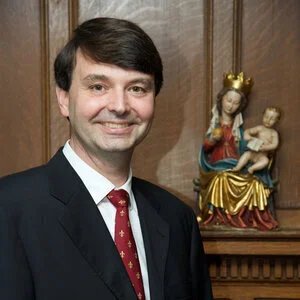Chimeras are hybrid creatures that result when the DNA from two or more individuals or species are mixed. The word chimera comes from ancient Greek mythology. The Chimera was a monster with the body of a lion, the head of a goat protruding from its back, and a tail ending with the head of a snake.
Read MoreAbortion is unique among ethical violations. It is a particularly grave offense because of the complete innocence of the victim and the usual consent and active participation of those who have a sacred duty to protect the life of the child. Doctors and nurses are called to a higher ethical standard than most professionals. Committing abortions is a perversion of medicine and the polar opposite of their mission to heal and preserve human life.
Read MoreThe time of greatest significance in our entire existence is the instant of our death. How our souls are disposed at that moment determines our eternal destiny. If we are oriented to God and reject sin, we are on the path to salvation.
Read MoreAnyone who understands the scientific fact that human life begins at the moment of conception, and who agrees that human beings have rights, cannot accept as ethical the process of creating human embryos in laboratories with the full knowledge they will die or be killed at either 14 or 28 days.
Read MoreAs a bioethicist I find it unconscionable and astonishing that ethics review of significant scientific research projects is seen as unnecessary by officials at the highest levels in our country.
Read MoreAs president of The National Catholic Bioethics Center (NCBC) and a longtime international pro-life advocate, I have some considerations regarding serious ethical problems related to proposed COVID-19 vaccine passports and how such certificates of immunity could be misused.
Read MoreThe staff of The National Catholic Bioethics Center (NCBC) recently renewed our consecration to St. Joseph as our protector and guardian, especially for our temporal needs.
Read MoreThere is a Christian and very specifically Catholic wisdom concerning the human body and human sexuality.
Read MoreThere is a Christian and very specifically Catholic wisdom concerning the human body and human sexuality.
Read MoreThe largest number of consultations we receive at The National Catholic Bioethics Center deal with end-of-life decisions. Sometimes people even call after the death of loved ones to ask if they made the right decisions on their behalf. They want to be reassured that they did the most loving things they could have for them. In cherishing the memory of loved ones, it is striking how often their last words are mentioned.
Read MoreBioethics is one of the few academic disciplines and professions that does not have a patron saint. We at The National Catholic Bioethics Center (NCBC) think this may change soon.
Read MoreCatholic Bioethics has a special focus on the dignity of the human body. This flows naturally from the great appreciation we should always have for the marvelous qualities of our flesh and blood. The human person is a composite being of body, soul, and spirit.
Read MoreI was thrilled when the Church proclaimed a year of St. Joseph from December 8, 2020, to December 8, 2021. In his apostolic letter Patris corde (With a Father’s Heart), Pope Francis urges us “to increase our love for this great saint, . . . to implore his intercession and to imitate his virtues and his zeal.” We need St. Joseph more than ever in the midst of this COVID-19 Pandemic.
Read MoreMaking good conscientious discernments is one of the most important tasks of every person. If we cannot see clearly what is right or wrong, or possess the inner strength to pursue what is right, we can expect serious trouble to follow. The worst possibility is our own eternal separation from God in hell or our leading others into this calamity.
Read MoreAs the historic COVID-19 pandemic is intensifying worldwide and draconian emergency measures are being reinstituted in Europe and elsewhere, I see an urgent need to repeat a defense of the right of patients not to be forced to die alone in hospitals or nursing homes.
Read MoreOne of the most important tasks in bioethics is distinguishing between ordinary and extraordinary means when it comes to medical care. The reason this distinction is so vital is that Catholics have a moral obligation to receive ordinary care for themselves and give it to others. What is deemed to be extraordinary is morally optional; persons can choose if they do or do not want to receive such care.
Read MoreCatholics, like all other citizens of the United States of America, have a duty to participate in our representative form of government by informing themselves about the issues and stances of candidates and then voting.
Read MoreThe Congregation for the Doctrine of the Faith (CDF) recently issued a letter, Samaritanus bonus: on the care of persons in the critical and terminal phases of life. This document from the Church provides important guidance about the Catholic view of end of life care. It notes with regret that we live in an age when euthanasia and assisted suicide are growing threats and temptations to people all over the world.
Read MoreThe difference between the Catholic perspective on the dignity and rights of human persons and those of many secular and liberal thinkers seems to be widening. The COVID-19 pandemic and recent events have only served to make the contrast even more stark between truly Catholic health care and other visions of public health or medicine.
Read MoreThe National Catholic Bioethics Center (NCBC) exists to promote and defend God’s plan for creation and the dignity of the human person as championed by the Catholic Church. It is an exciting and a vital mission in our day when so many scientific discoveries and cultural trends attack and exploit vulnerable human beings and the very order of nature.
Read More



